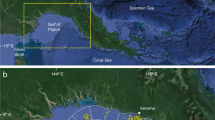Abstract
DURING April and May of this year, there has been a heavy mortality of Portuguese oysters, Crassostrea angulata Lmk., which were imported into Britain from the River Tagus (Portugal) in March. Losses in some cases exceeded 90 per cent.
This is a preview of subscription content, access via your institution
Access options
Subscribe to this journal
Receive 51 print issues and online access
$199.00 per year
only $3.90 per issue
Buy this article
- Purchase on Springer Link
- Instant access to full article PDF
Prices may be subject to local taxes which are calculated during checkout
Similar content being viewed by others
References
Howell, B., Key, D., and Shotton, R., Intern. Coun. for Exploration of the Sea, Shellfish Communications, Document No. K12 (Copenhagen, 1968).
Farley, C. A., J. Protozool., 15(3), 585 (1968).
Mackin, J. G., Bull. Mar. Sci. Gulf and Caribbean, 1, 72 (1951).
Mackin, J. G., and Ray, S. M., J. Invert. Pathol., 8(4), 544 (1966).
Orton, J. H., Fishery Invest., London, Ser. II, IV, 3 (1924).
Voisin, P., Rev. Trav. Office des Pêches Maritimes, IV (2), No. 14, 221 (1931).
Author information
Authors and Affiliations
Rights and permissions
About this article
Cite this article
ALDERMAN, D., GRAS, P. “Gill Disease” of Portuguese Oysters. Nature 224, 616–617 (1969). https://doi.org/10.1038/224616a0
Received:
Issue Date:
DOI: https://doi.org/10.1038/224616a0
Comments
By submitting a comment you agree to abide by our Terms and Community Guidelines. If you find something abusive or that does not comply with our terms or guidelines please flag it as inappropriate.



